EECS Undergraduate Student Eric Brownrout & Team Win $10,000 Grand Prize at LinkedIn’s Intern Hackday
The team members will use their prize to continue further development on their startup company Asterisks, which is as an easier and safer way to lend accounts to friends.
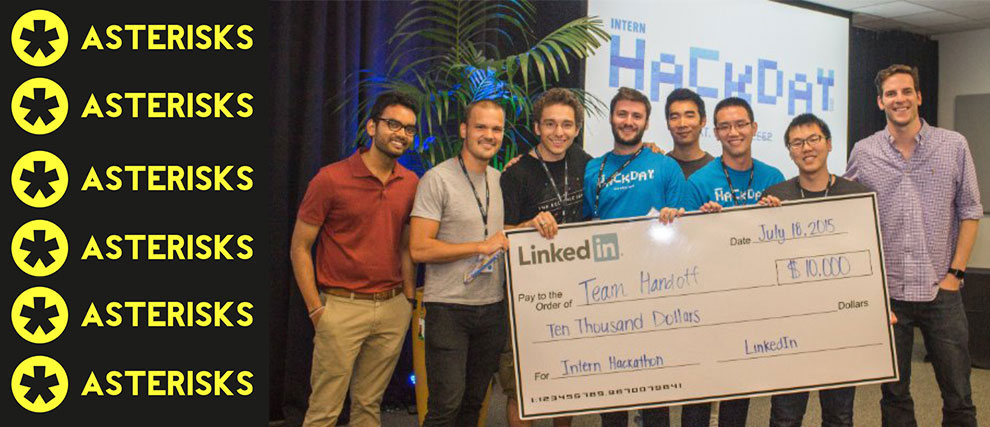
EECS Undergraduate Student Eric Brownrout (Senior, majoring in CS) and his team comprised of four other students from Harvard, Waterloo, MIT, and Brown, have won the 5th Annual LinkedIn Intern Hackday, held from Friday, July 17th to Saturday, July 18th at the LinkedIn Headquarters in Mountain View, CA.
The members of "Team Handoff" will use their $10,000 grand prize to continue further development on their startup company Asterisks, which is as an Google Chrome extension that creates an easier and safer way to lend accounts to friends. Read a recap of the event
Use Asterisks to add your streaming accounts and they'll help you share them with friends without disclosing your password to them. The Google Chrome extension will also help streaming services and content providers by getting new users hooked on their content through their lightweight, frictionless free trials and ultimately converting them into paid users of these services. Asterisks currently support over 10 services, with more on the way soon. Download Asterisks at the Chrome Store
Brownrout is interning this summer as an Associate Product Manager Intern at LinkedIn. He wrote a recap of the experience, which can be viewed, below.
Have you ever shared your Netflix account with a friend or colleague so they could binge watch a show? Or been concerned about sharing and borrowing paid internet services with friends (e.g. Hulu, New York Times, etc.) because you’re uncomfortable sharing your passwords and usernames? Maybe you’ve wished there was an easier way to trial services before committing to buying.
So have we. That’s why our team developed a way to share accounts among groups of friends without having to share your login information. Allow me to backtrack to where it all began.

The Team
This GroupMe message to all the LinkedIn interns is where the story begins. Christian’s team was in search of a designer for LinkedIn’s upcoming Intern Hackday in July. The event took place at LinkedIn’s Mountain View campus where over 220 interns from companies around the Bay including Facebook, Google, and Twitter gathered to build out crazy and cool ideas. With a passion for design and without a crew, I decided to reach out to Christian to join his team, and I’m glad I did. Over the 24 hours of Hackday I got to know the quirky personalities and incredible talents of my teammates (Christian Mathiesen, Fernando Trujano, George Lok, and Clement Fung) who also happened to share an apartment together. Between the five of us, we had a pretty good balance of skills and expertise, which helped us to divide and conquer. In the month or so leading up to Hackday, the four roommates had been brainstorming potential hacks after work. Which brings us back to…
The Idea
I officially met the team and was brought up to speed three hours before Hackday began. The concept was simple and intriguing:
Airbnb for Internet Accounts
People who had travel plans or were not going to be using their Netflix, HBO, New York Times or other paid subscription services would be able to rent them out in order to make some cash. We were happy with the idea, and had several ideas on how to approach the problem from a technical standpoint.
However, with our Hackday resources, constraints, and personnel in mind, we continued to brainstorm other variations as well. After a few constructive debates, we agreed on a slight twist to the idea:
Borrow and share Internet accounts without sharing credentials
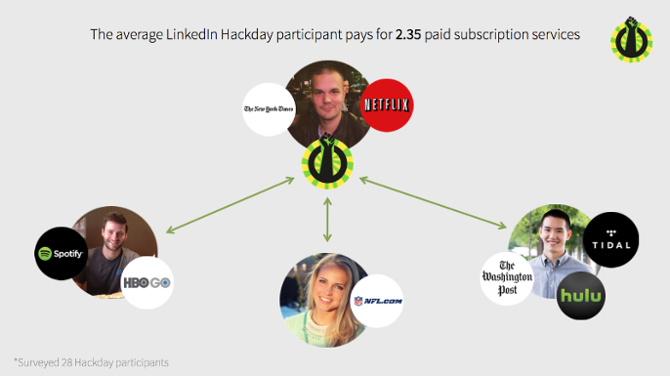
With money and payments off the table for now, we were able to focus on solving a specific problem that was close to home for both us and many millennials across the country. Our survey showed that people are uncomfortable disclosing their login information, even to their friends. Sharing these credentials can be a security risk, as many people reuse the same password for many sites and services. Furthermore, there is no way for someone sharing an account to know who is using his or her account and when, or to prevent friends from further sharing the account with others. But mostly, nobody likes to login to Netflix to find that all of their streams are already in use.
We gathered around the whiteboard to determine what features were critical to our Minimum-Viable Product (MVP) and how we would build this system. Then we joined the rest of the teams in the LinkedIn cafeteria as the official start of Hackday was announced. It was time to start building.
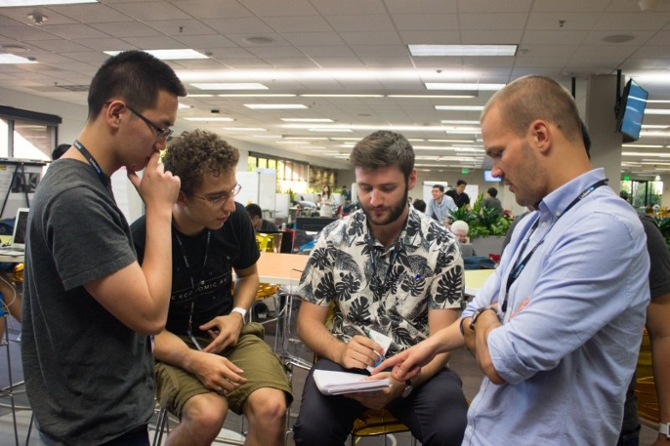
The Hack
We decided to build our service as a self-contained Chrome extension. We believe a Chrome extension makes for the best user experience since it can smartly target users in-browser and automatically manage services based on the sites they are visiting. After adding personal accounts and services to our extension, users can safely share their accounts with friends as well as browse available services from their network. This method allows the person lending their account to retain complete control over who can use his or her accounts and when, without ever sharing a user name or password. Account owners can even log friends out of their accounts mid session if they’d like.
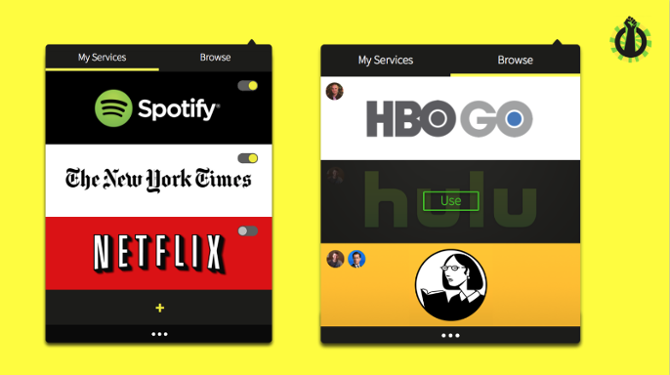
We built our backend with Node.js, MongoDB, and murky PHP scripts. The frontend (the Chrome extension) was good old-fashioned HTML and Javascript. Our backend didn’t run on a dedicated server, but rather on Fernando’s laptop, so whenever his computer went into sleep mode so did our entire application.
We stayed up all night building out our demo and deck, and by time the sun came up we had taken care of most of the major functionality. We squashed a couple bugs and began practicing our demo and pitch. The first round of demos began, and we were on deck to present. One minute before we took the stage, we discovered that we had accidentally nuked our database. That is, we deleted all of our existing demoable services. Trying our best not to panic, I took the stage and began to present our deck. Behind the scenes, Clement calmly tried to resolve the situation. It turns out Fernando had finished implementing a way to add services through our front-end, but it was untested. It was the only chance we had, so Clement gave it a shot. It worked. The services were added only moments before I finished our pitch and the team began our demo. It was a close call, but luckily the demo worked as planned.
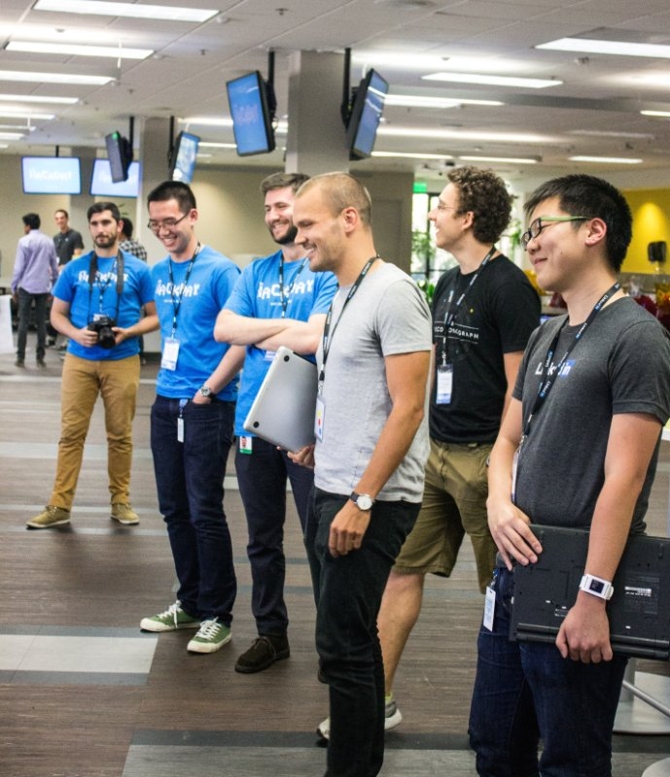
After the first round of forty plus teams wrapped up, we were happy to find out we were among the 12 teams selected to move on to the finals. The remaining teams presented to the Final Round Judges: Akshay Kothari, Matt Huang, and James Beshara. There was a wide variety of hacks presented, from websites to help students discover career paths, to iPhone space-blasters that granted in-game abilities based off one’s LinkedIn skills, education, and connections. After deliberation, the judges announced the top five teams which also included:
- Wavelength — An Android app to help you and friends collaboratively discover and listen to music
- BiaSees — An iPhone app that helps combat gender inequalities in job postings by removing language that discourages either gender from applying
- LAP — A website that helps prisoners reintegrate into society upon release
- Broom — A fast, easy, and secure way to video conference with anyone
Overall, LinkedIn’s Intern Hackday was an incredible experience. Our team would like to thank everyone involved in putting on the event. From human bowling to midnight food trucks, it is clear that a ton of effort was put into creating a great environment for hacking, and it really showed through in the quality of all the final projects.
Future Plans
We were blown away by the amount of people who’ve reached out to us saying they would love to use our service, many even volunteering to beta test. Given the enthusiastic response, we have decided to continue developing the project. The service is now called Asterisks (inspired by password fields), and we are working nights and weekends to ship a closed beta this month.
We believe there is potential here for Asterisks to help streaming services and content providers by getting new users hooked on their content through our lightweight, frictionless free trials and ultimately converting them into paid users of these services.
Check us out at asterisks.io and subscribe to our mailing list to stay notified of when Asterisks is available for you and your friends to use. Thanks for reading!

The Asterisks Team
Christian Mathiesen
Clement Fung
Eric Brownrout
Fernando Trujano
& George Lok
